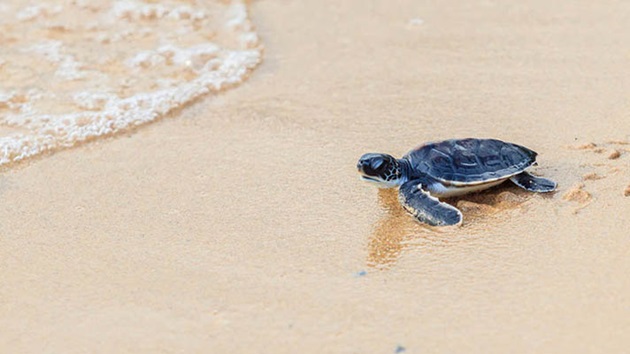Our CEO, Rupert Howes, explains how the MSC is working with stakeholders to review requirements on fisheries’ interactions with endangered species.

This week the Guardian published a detailed article on the challenges faced by the MSC. The case study of the tragic death of right whales in the Gulf of St Lawrence due to entanglement in fishing gear provides a very real example of the challenges we face. It also demonstrates how the MSC is helping to influence improvements on the water.
Whales, climate change and fishing
Since the first snow crab and lobster fisheries in the Gulf of St Lawrence were certified to the MSC Standard in 2012, there has been a well-documented change in the migratory patterns of right whales associated with climate change. Over the past five years, these changes have brought more right whales into direct contact with fishing gear – lobster and crab pots, connected to the surface by long ropes in which whales can become entangled. They have also brought right whales closer to shipping lanes where they are at greater risk of being struck and injured or killed.
For a highly endangered species, with an estimated remaining population of less than 400, every right whale death is a tragedy. Reflecting this, in 2018 the Southern Gulf of St Lawrence snow crab fishery which was associated with right whale entanglements, had its MSC certification suspended and has since withdrawn from the MSC program. The ongoing question that the Guardian highlights is whether other fisheries in this region should remain certified.
Since the first reports on right whale entanglement, government management agencies and fisheries, have taken significant steps to understand fisheries’ impacts and to further protect right whales. Both the US and Canada conduct aerial flights to locate right whales approaching the fishing grounds and in many cases those fishing grounds are then closed while whales remain in the area. Fisheries are also working to better identify their gear so there is a better understanding of where whales are becoming entangled. New data on right whale interactions is considered as part of annual audits to the MSC Standard and any entanglement within an MSC certified fishery would trigger an expedited audit.
Assessments based on evidence
Certification to the MSC Standard is based on evidence, with assessors taking a precautionary approach to determining the impacts of fishing on the wider environment. Assessments of these fisheries have provided no direct evidence that they are actually causing the death of right whales. They have also demonstrated that there are significant measures in place to protect right whales.
Without MSC certification, these fisheries would still set their pots, and their catch would continue to be sold to consumers. Ongoing MSC certification offers continued public scrutiny, traceability, expert review and open reporting. It also provides fisheries with an added incentive to find solutions to the problem to right whale entanglement, working with management agencies, so that they can maintain the market advantages that MSC certification brings.
This is just one example of how MSC certification can help to provide greater oversight and incentivise change. Over the past two decades, MSC certified fisheries have delivered more than 1,700 improvements as conditions of certification. The current, strict requirements of certification to the MSC Standard have resulted in numerous fisheries reducing their interactions with marine life, helping to reduce their impacts on, for example, albatross, sea lions, dolphin and whales.
Developing requirements on endangered species
However, we recognise the need to go further, to provide greater clarity on the MSC’s requirements for endangered, threatened and protected (ETP) species. This is why we’re currently consulting on new requirements to further confirm the level of protection required for ETP species and bycatch more broadly. These new requirements, to be finalised in early 2022, could see greater monitoring, a new system to classify ETP species and new conditions placed on fisheries to further reduce their interactions with non-target species.
A broad church of stakeholders from the conservation community, some of whom are quoted in the Guardian’s article, fishing industry representatives and technical experts have already and will continue to input into how these requirements evolve. Birdlife and WWF, who are quoted in the article, have representatives on our Stakeholder Advisory Council, which advises the MSC’s Board, ensuring these points are considered.
It is important that the changes made to the MSC Fisheries Standard reflect the latest science and are based on widely agreed evidence. We cannot operate on gut feelings which may evolve and change and may ‘feel’ different to those with different perspectives. While conservationists’ views are welcome, those of the fishing industry and regulators are equally valid. This is why our Fisheries Standard Review will take the time to consider all perspectives and evidence.
Engaging more fisheries, increasing sustainability
As the MSC program evolves we are confident real and lasting change will continue to be delivered to the way our oceans are fished. Over 400 fisheries, accounting for around 19% of the total annual wild harvest from our oceans, are engaged in the MSC program, opening themselves up to public scrutiny. We know these fisheries are well managed.
As we work together to identify meaningful updates to the MSC Standard, it is imperative that we do not take our eye off the bigger picture. We must not lose sight of those other fishing operations responsible for some 80% global wild seafood harvest which are not engaged in the MSC program. These fisheries lack the additional oversight, incentive for continued improvement and credibility afforded by a globally recognised, science-based certification for sustainable fishing. UN data shows us that the worsening global trend in global overfishing is continuing – more than a third of fish stocks are now overfished. It is here that the greatest ecological gains are likely to be delivered.
If we’re to really shift the needle on global fishing, delivering the ambitious targets set by the Sustainable Development Goals, we need to work together to broaden our influence and calls to action. This means engaging fisheries in low income countries and with less proactive governments to start improving their practices with a hope that in the future they might just reach a point where they too could be within reach of MSC certification. If all fisheries were to attain the levels of reporting, monitoring and transparency seen within the Gulf of St Lawrence fisheries, we might be looking at a far brighter future for our oceans and the 50 million people employed in the seafood sector.
A side note on conflict of interest:
The Guardian also points to potential conflicts of interest arising from fisheries paying for an assessment to the MSC Standard. The MSC receives no income from assessments. Payment goes directly to the conformity assessment bodies (CABs) responsible for assessing the fishery. Many checks and balances within a CAB’s assessment of a fishery ensure that they take an informed, balanced view, free from conflict of interest. This includes expert peer review, public consultation and oversight by the accreditation body that permits CABs to carry out assessments. Failure to take an impartial view could result in a CAB losing its accreditation to conduct MSC assessments, which could significantly undermine its reputation and ultimately its income.
Decisions to certify or suspend a fishery are made independently of the MSC. It is worth noting that the ecolabel licensing revenue generated by the MSC for the sale of certified North American lobster and snow crab, the fisheries under question in the Guardian article, is less than one percent of the MSC’s annual income from labelled seafood sales. Far more financially important species, including mackerel and herring fisheries have seen their MSC certification suspended in recent months due to a lack of international government agreement on quota setting within scientific limits.



